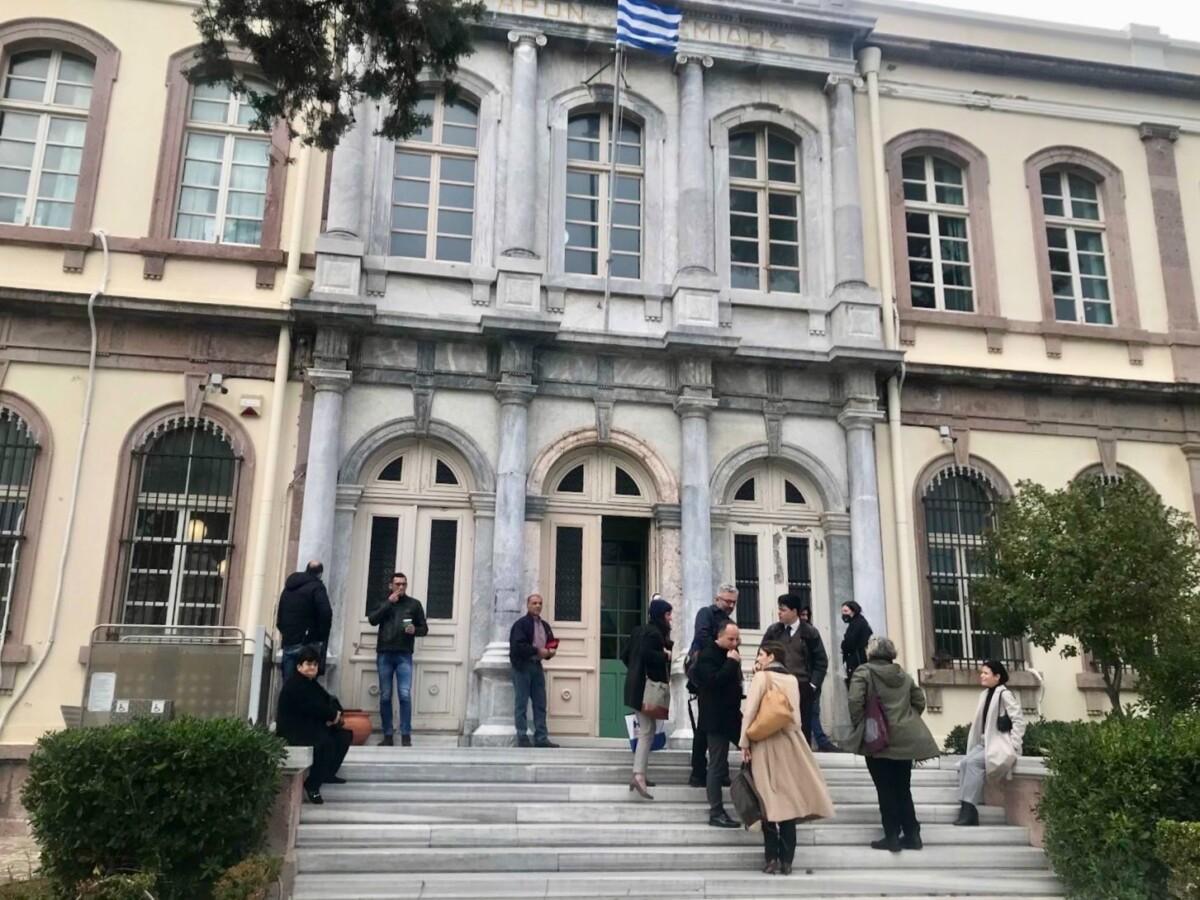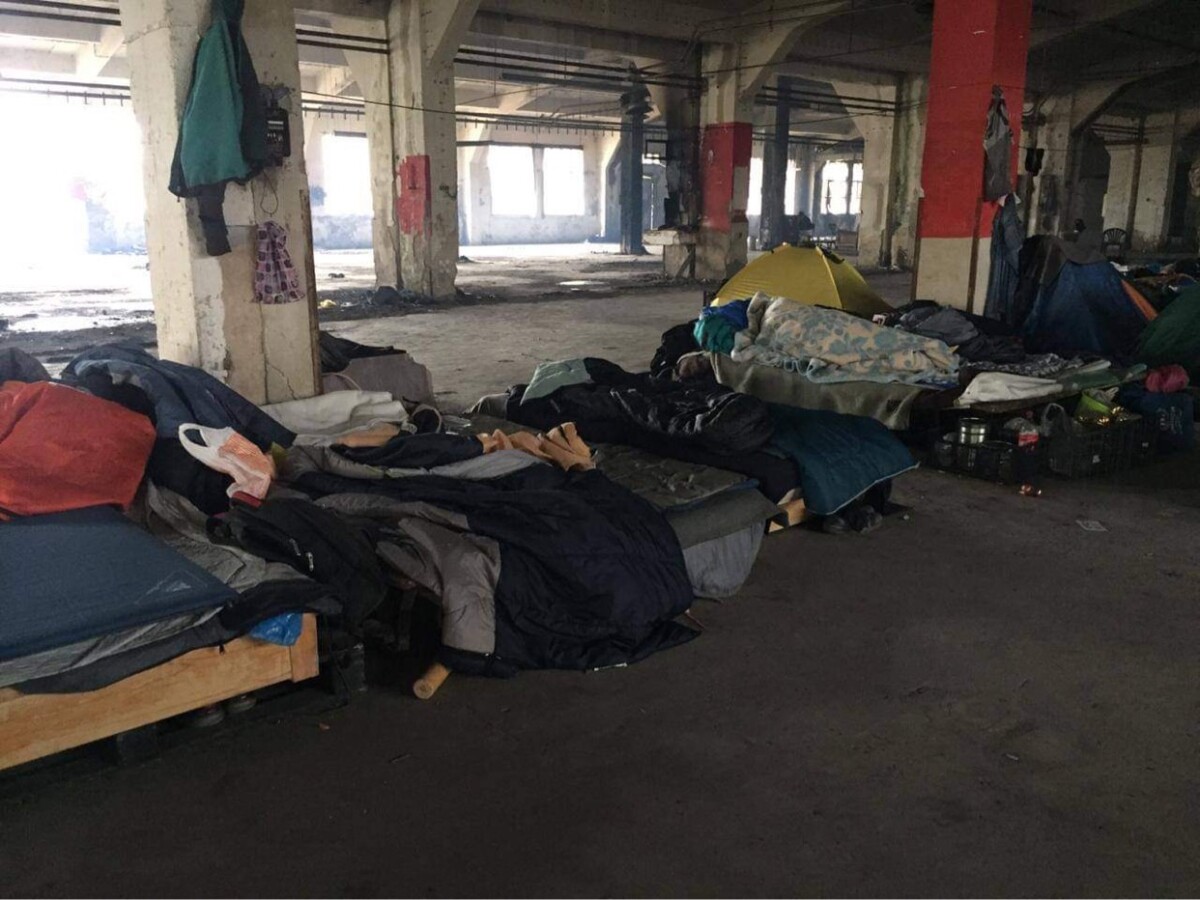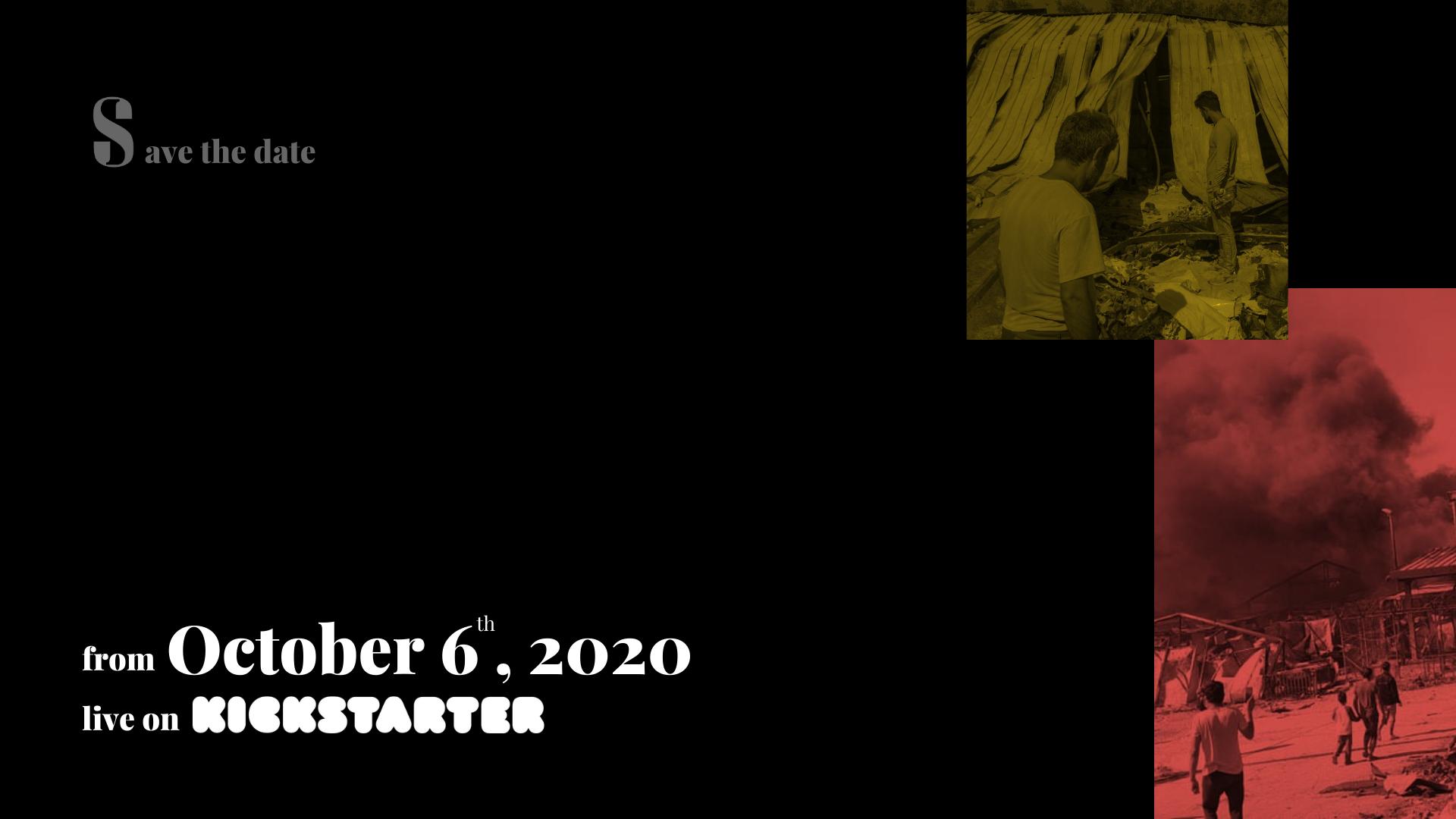Update: The misdemeanor case continued Friday, January 13th after the time of publication of this article. All the charges against the foreign defendants were dropped because the indictment had not been translated into a language they could understand. For the Greek defendants, the charge of espionage was dropped due to the vague description. Two of the Greek defendants will be referred back to a lower court – one for the charge of forgery, and one for the charge of supporting a criminal organization. For all of the defendants, the felony charges are still pending and the criminal investigation is still ongoing. The statute of limitations on felony charges is 15 years.
The night before the trial began, Nassos Karakitsos was trying to remain positive. “I am optimistic,” he said. “But also stressed. You never know because we are in Greece, and you never know. Even if you are 100 percent right. Everyone knows it’s not just about the justice system, it’s also a political case.”
Karakitsos, along with Sean Binder and Sara Mardini, is one of 24 aid workers who have been indicted with facilitating migrant smuggling and espionage among other charges for their work providing emergency support to refugees arriving on the island of Lesbos in 2016 and 2018. The accused have been waiting over four and a half years for the trial to begin, and face up to 25 years in prison for the highest charges.
The case has been identified as “the largest case of criminalisation of solidarity” in Europe. The charges have been labeled as “baseless”, and “farcical” by human rights watchdogs, and “spurious” and “harassing” by members of the European Parliament. The UN Committee against Torture has noted it as a cause of concern. Two lawyers working on the case told Solomon that they view it as “judicial harassment”.
“This is our concern. This is the only fear we have,” said Karakitsos. “We worry that tomorrow or in the next days, the justice system there won’t work as European. That it won’t work according to its own laws.”
Though the case, which began on Lesbos Tuesday, has garnered a high international profile, many of the details of the charges and why it has taken so long to come to trial are due to specific workings of the small Mytilini court and the island police that brought the charges. Solomon has reviewed legal opinions, and spoken to defendants and lawyers in order to peel back precisely what is at play in the case, which is set to continue on Friday.
The 2018 charges against ERCI
Nassos Karakitsos, Sean Binder, and Sara Mardini all worked with Emergency Response Centre International on Lesbos. Karakitsos was a former maritime security officer turned NGO field director, coordinating the organisation’s shoreline response – which consisted of monitoring refugee boats that arrived, communicating with officials, and providing immediate support.
Binder and Mardini were volunteers with the group who provided this immediate support, which Binder has described as mostly waiting on a beach to provide arrivals with blankets and water bottles. Binder had trained as a rescue diver in Ireland, and Mardini was a competitive swimmer in Syria who herself had made the dangerous Aegean crossing. When Mardini’s rubber boat began sinking on the crossing in 2015, she and her younger sister dove into the waters and swam alongside the dinghy to shore. A Netflix film based on their lives was released this November.
On February 9, 2018 Binder and Mardini were waiting on a Lesbos beach when police arrived and checked their ERCI jeep. They stated there were fake military plates concealed under the vehicle’s licence plates and arrested the volunteer pair. The two were released but the police opened an investigation. Months later, on August 21, 2018, the day Mardini was set to return to university in Germany, she was arrested again. Binder and Karakitsos were arrested soon after, and all three were held for over 100 days in pre-trial detention.
They were charged, along with 21 others, with a combination of misdemeanors – illegally tuning in to radio frequencies, forgery, and espionage; and felonies– facilitation of migrant smuggling, forming a criminal organisation, money laundering, and fraud.
The Hellenic police issued a press release stating: “The activities of an organised criminal network that was systematically active in facilitating the illegal entry of foreigners into the Greek territory were fully disrupted”.
The story was quickly picked up by the international press, with headlines such as “’Hero Syrian swimmer arrested by Greek police for helping migrants reach Lesbos”. Over 30 members of the European Parliament wrote to the Greek minister of justice calling for the aid workers’ release. They were finally released in December 2018 after their lawyers were able to post bail.
In 2019 the trial was split in two in order not to miss the statute of limitations– one with the misdemeanors and a case for the felonies which is still pending. The misdemeanor case began on Tuesday in Mytilini, four and a half years after the initial arrests.
Thin Charges
“All of the accusations are based on arbitrary assumptions by the police, nothing more,” said Mardini and Binder’s lawyer, Zacharias Kesses. “Along with the fact that the police are naming simple humanitarian actions as facilitation of migrant smuggling.”
A Human Rights Watch review of the case similarly concluded the charges lacked adequate evidence.
The indictment states the aid workers committed the crime of espionage– for tuning into Greek Coast Guard and Frontex radio channels, and then transmitting this information with “encrypted social networking and communication” tools. Vicky Aggelidou, a lawyer who works for the Lesbos Legal Center and is also on the defense, said the charge of espionage “is totally problematic”. She explained, “Espionage means to steal a country’s secrets, and give to other countries in order to create problems for the national sovereignty and the stability of the country.”
However, as stated in the police report, the Coast Guard and Frontex radio channels are open and can be accessed by anyone with a VHF radio, thus were not Greek secrets. The Coast Guard had used that same channel to coordinate rescues with NGOs. The special encrypted tools the group used were two Whatsapp groups that Kesses said had hundreds of members, including those of other organisations such as UNHCR, and contained no evidence of communication with smugglers or the like.
Additionally, one of the smaller misdemeanor charges is listening to confidential radio frequencies– but this is illegal according to a law that was repealed in 2020, and thus can no longer legally be tried.
The felony charges of money laundering and fraud are similarly thin. Though the police searched through Mardini and Binder’s bank account records, the only evidence provided to support the charge of money laundering is one Facebook message where Mardini wrote: “I am a long-time volunteer and I help with fundraising.”
The two allegedly committed fraud involves ERCI using fake military licence plates to enter restricted military areas. The HRW analysis stated, “But it is unclear how the volunteers could have pretended that they were driving a military vehicle, because witnesses said, and photographs confirmed, that the car prominently displayed logos of their rescue group.”
Mardini and Binder are further accused of communicating with refugee boats to avoid the Coast Guard– which, according to Greek law, amounts to facilitating migrant smuggling. But there is no evidence of communication with migrant boats in the police report, and thus in the prosecution’s case.
On the contrary, Kesses has submitted evidence that ERCI and the volunteers were in frequent communication with the Coast Guard. “Each time ERCI members had information about incoming boats, at the same moment the coordinators or ERCI, Nassos and Sean, were notifying the port police officers,” said Kesses. “We gave a screen print of all of the messages that were sent from the officer or ERCI to the port police officer. And because we gave these screen prints of the messages, the investigator in September called this officer and he testified that ‘yes I was notified.’”
There is, in fact, evidence–attested to by the universities they were attending at the time–that Binder and Mardini were both not in Greece in six of the 11 times they were charged with smuggling. Additionally, there is a provision of the very law the aid workers were charged under, which states that those aiding asylum seekers, those helping people seeking safety, cannot be penalised legally anyway.
Beyond this, several procedural issues in the case of the ERCI workers: Kesses pointed to the “serious procedural irregularity” that the indictment was not served to several defendants in a language of their knowledge, only in Greek. Some of the indictments were served missing a page. Other members of the defense explained that the charges were too vague in that they did not clarify which defendant of the 24 was being charged in which time frame.
Finally, some of the misdemeanor charges brought in the first trial are predicated on felony charges which are still under investigation, a procedural breach in the defendants’ presumption of innocence. “Maybe in the future, there will be a decision of the judges not to send the defendants to trial because there’s not enough evidence,” said Aggelidou after the first day of the trial. “So today’s misdemeanor charges are based on felonies, which have not been brought.”
Binder’s international legal team commissioned a legal opinion on the legality of his arrest, detention, and court procedures, in accordance with international law. They found that Binder’s pre-trial detention was likely to have been excessive and in violation of the European Convention on Human Rights and the International Covenant on Civil and Political Rights, the evidence in the case is insufficient for the charges brought, that the conduct of the prosecution “jeopardises Seán’s right to know the case against him” and that the slow processing of his case likely constitutes a violation of his right to a fair and timely trial.
Another legal analysis, written by a UK immigration lawyer and vice-chair of the Institute of Race Relations concluded, “The exceptionally serious charges brought against the defendants, the lack of evidence to support the charges, the failure of the prosecutor to apply or even consider the humanitarian exemption, all suggest that the prosecution had been brought as a result of EU pressure on the Greek authorities to show they are taking the ‘refugee crisis’ seriously, and as a deterrent to humanitarian volunteers, rather than an honest response to evidence of criminality, and as such demonstrate bad faith and violate the defendants’ rights to a fair trial, due process and proportionality.”
Kesses sees the case as an instance of judicial harassment–charges were brought not to result in convictions, but to frighten and deter people from providing aid to asylum seekers. “The same officers that created the file in 2018 are the same officers that created the file in 2016 against the Spanish Fire brigadiers, and the same officers which created the file against Mare Liberum, against any organisation that was active on the island,” said Kesses. “And if you compare the police reports, they are identical, copy-paste, just changing some basic stuff.”
Karakitsos feels much the same: “They have a pattern. They started with us, and they continue to do it. All the things they write and say are baseless,” he said. “They just want to prevent people from going to help. So what will they do? They will do the same, and the same and the same.”
Though in official communications, Greece has justified the prosecution of the aid workers, in private they have admitted to journalists that the goal of the charges was to remove and deter volunteer-activists from the borders.
The trial continues
Despite the international outcry and attention, the ERCI case continues. When the case was first meant to go to trial in November 2021, there were no translators called, and it was adjourned due to lack of jurisdiction over one of the defendants–a lawyer who under Greek law, must be tried in a different court.
In the meantime, Karakitsos, Binder, Mardini, and the other defendants have had to wait.
Karakitsos has a geographic restriction placed on him and is unable to leave Greece as he waits for the trial. He has received job offers outside of the country but was denied his applications for the restriction to be lifted. Binder has studied law but is unable to become a lawyer in the UK while he has a criminal trial pending. Mardini was listed as a threat to Greece’s national security once she was freed from detention, and was not permitted to return to Greece for years, including for the first date of her trial. The defence has underlined that this too, denies Mardini the right to a fair trial.
Kesses believes all of the defendants will be acquitted and is “100 percent certain” that eventually Greece will be convicted in the EU Court of Human Rights for breach of the reasonable duration of the procedure, and breach of the presumption of innocence. “I imagine myself in 2026, being enthusiastic because we won the court in the EU Court of Human Rights. And then I will give it to Sara and Sara will ask me ‘what should I do with this now?’” said Kesses. “I cannot bring the time back. I cannot save the time she spent in prison.
When the trial finally began in Mytilini on Tuesday, Kesses and the defence team spent the day posing procedural objections that they argue render the case impossible to take to trial– the missing pages of the indictment, the fact the indictment was not served in the right language, the vagueness of the charges, the charges predicated on felonies. The judge heard the objections and the case was adjourned until Friday.
After the proceedings, Binder seemed undeterred but frustrated. “The prosecution has made mistake after mistake, they have violated our human rights, they have made procedural errors, they have done everything possible to make sure that this trial can’t happen,” he told journalists outside the courthouse steps. “We’re supposed to have democratic values and basic principles. And I hope on Friday that is the case.”




